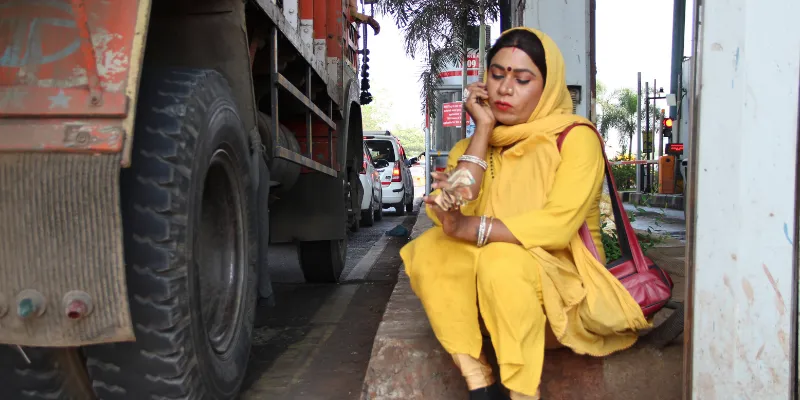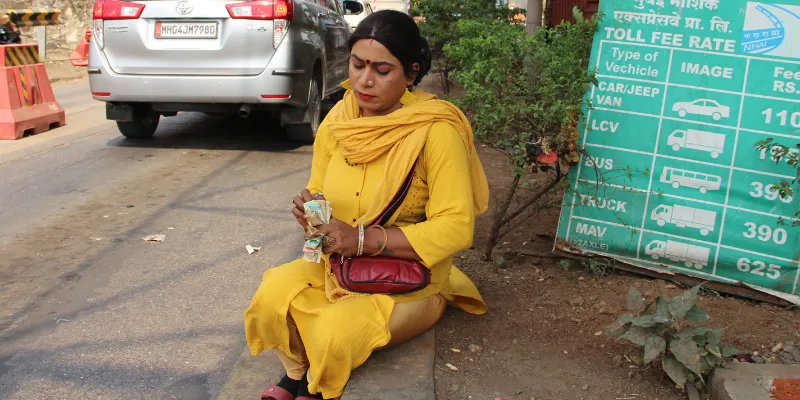As India fights its second COVID wave, the country’s trans community is caught in a vicious circle
The wounds of last year had hardly begun to heal as the trans community, along with India’s 1.38 billion population, now face another slew of lockdowns in the wake of the second wave of COVID-19.
The period between March and June, featuring occasions like Navratri and Ambedkar Jayanti, is Vidya Sagar’s time to shine. With all of Maharashtra her stage - performing her way through the festive season, in cities and villages and at events and fairs - the trained Lavani dancer, who belongs to the Hijra community in Mumbai, garners enough love, acclaim and earnings to comfortably last her through the monsoon.

Vidya Sagar. Image Credit: Zoya Lobo
But the world’s largest lockdown, imposed hurriedly in India in March 2020, stripped her of these crucial months, profoundly affecting the way she saved, earned and lived for the rest of the pandemic. These wounds had hardly begun to heal as she, along with India’s 1.38 billion population, now face another slew of lockdowns in the wake of the second wave of Covid-19.
India is experiencing a rapid escalation in its contagion rates, having gone from under one lakh to over 3.5 lakh daily new infections over the course of April. State governments across the country are imposing lockdowns to counter the surge.
A recent Pew study established that its economic fallout pushed a record 7.5 crore more people into the official category of ‘poor’ in India - earning less than Rs. 150 a day. As lockdowns are enforced for a second time, Anindya Hajra of the Pratyay Gender Trust, which works towards mobilising support for the trans community in India and pushes for policy change, says that governments have yet again failed to conjure up a safety net of social and economic security for India’s marginalised communities.
Amongst the worst hit of all of India’s vulnerable groups was the Hijra community - typically engaged in begging, sex work or seeking alms in exchange for blessings - and the lakhs of other trans people with daily wage jobs at small factories and other establishments.
“I blew through my savings in the first few months of the lockdown last year, and then literally lived week-to-week based on donations and support from NGOs,” Vidya says.
Now, the stage artist and social worker has resorted to the streets, basing herself at a toll naka (plaza) in Ulhasnagar to beg. But as traffic thins further every day, and alms get harder to come by, Vidya will once again be completely reliant on civil society and NGOs.

Image credit: Zoya Lobo
Like Vidya, a large number of trans people migrate to eastern UP and western Bihar at this time of year to dance at weddings - a significant source of income. Having missed this golden period two years in a row, they now find themselves trapped, both literally, locked in their homes, and figuratively, in a vicious debt cycle.
“The public space where trans people mainly worked - both within the Hijra community [engaged begging, sex work, and offering blessings at events] and outside it - practically evaporated. Hijra Gurus did try and support their chelas but that wasn’t sustainable beyond a few months,” notes Anindya.
For now, just like last year, the government has announced that they will be transferring Rs 1,500 into the accounts of eligible people by April 26. But the community has encountered barriers in accessing even these minimal aid schemes and stimulus packages. “Trans people who did try to avail [themselves] of the Public Distribution System were policed. The community had to protest this police harassment vehemently in order for them to not harass the community anymore,” states Anindya.
Last year, NCP leader and Lok Sabha MP Sharad Pawar announced a Rs 5,000 allowance for folk dancers. But even though Vidya sent in all the details required and registered, she says she did not receive the funds.
Moreover, producing government-certified IDs was mandatory to procure rations from the public distribution system and to open the bank account required to receive stimulus packages. For a host of reasons, many trans people do not possess these documents. Often, abandoned by their parents, they leave their homes with practically nothing. Others who do possess documents with their former “dead” names, biological sex and addresses have to undergo a bureaucratic obstacle course that some might consider “triggering," to get a government-issued certificate to “legitimise” their trans identity.
But the process is no better a year on. Vidya recounts how despite attempts by 250 trans people to get their Aadhaar cards (Unique Identity card), PAN cards, ration cards and Voter IDs made, which initially attractive positive political publicity, her IDs are yet to be issued.
“I was asked to produce a medical certificate to renew my passport - even after getting my IDs changed. While I have the social capital to take them to court for this, not everyone else from the community does,” says Anindya.
The trans communities in many states have been demanding separate isolation wards on the grounds that it would be “traumatising” for them to share space with either men or women. But the experiences of trans people in the few facilities where segregated wards were created on a need-basis say the experience was not without challenges. “The biases are not pronounced but creep in in many experiences. Trans people received lesser assistance and attention in these wards. There are also privacy issues while getting assisted for going to the bathroom, changing clothes, etc.” says Anindya.
The larger, systemic issue here is that healthcare is still binarised and not prepared to tackle the complexity of trans patients, according to Anindya. “There is a dearth of research about whether the vaccine or covid medication is fully compatible with hormonal therapy, or how it might impact trans people with HIV who are immunocompromised,” she adds.
While this is not universal to the community, many trans people, says Anindya, are wary of getting the vaccine in order to avoid the stares and confrontations about documentation. Sonali, an active member of the Kinnar Maa Trust, an NGO working towards the welfare of the Hijra - Kinnar community, says that they have been sensitising members of the community and aiding them in getting the vaccine.
“Usually, ASHA [accredited social health activist] workers etc. conduct door-to-door awareness campaigns, but many people from the Hijra community in Mumbai have stated that ASHA workers have not made these interventions this time. As a result, the community’s apprehensions about the vaccine haven’t been quelled. Online registration is complex for the large section of uneducated people in the community, so we’re assisting everyone to get their vaccines.”
YourStory reached out to the Ministry of Social Justice and Empowerment for comment but did not receive a response.
Anindya is calling for the government to adopt a more deliberate intersectional approach to support the trans community through the second wave better: “If we’re truly a priority, subsistence measures need to be inclusive with an expert trans focus rather than ad hoc measures that are merely formulated for PR checklists."
(This story was produced by Yourstory.com. It was written as part of a media skills development programme run by the Thomson Reuters Foundation supported by the Swedish Postcode Foundation. The content is the sole responsibility of the author and the publisher.)
(Disclaimer: The views and opinions expressed in this article are those of the author and do not necessarily reflect the views of YourStory.)







